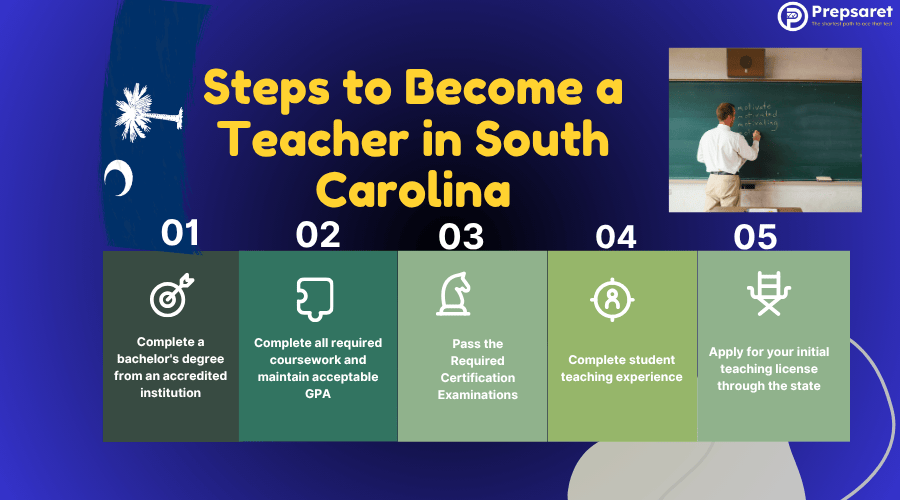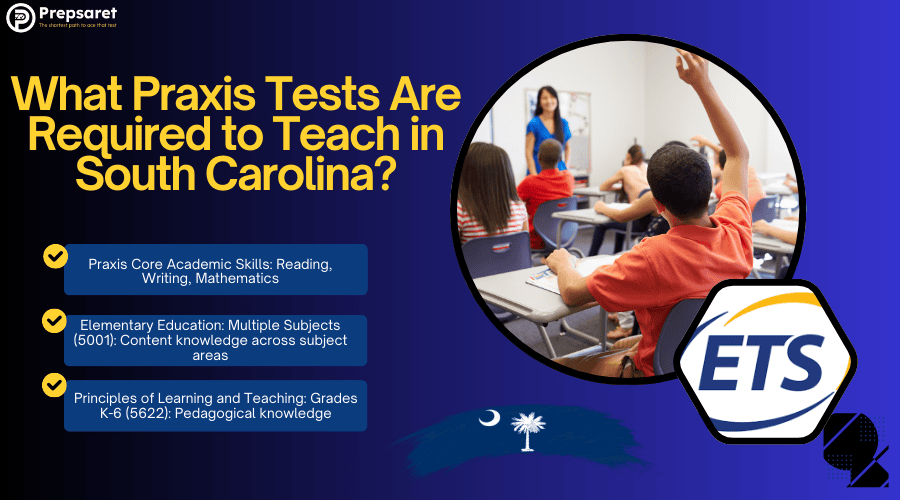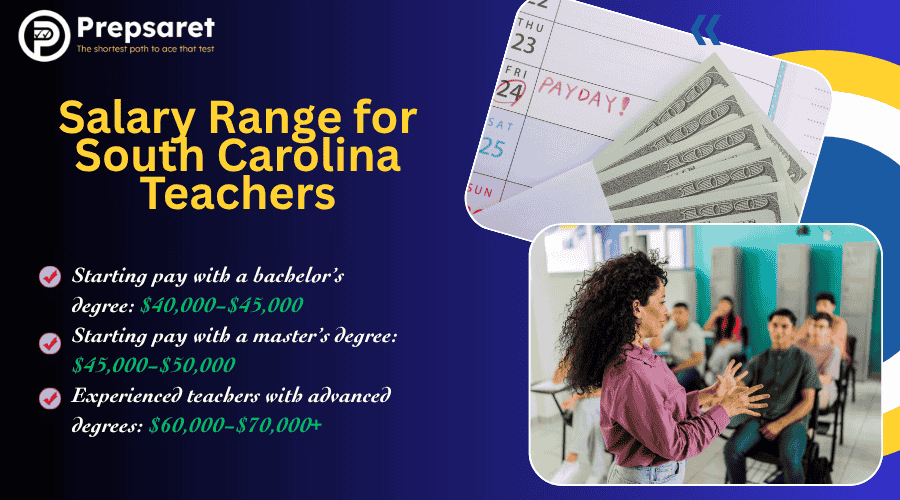Starting a rewarding teaching career begins with understanding the clear pathways available in the Palmetto State. How to become a teacher in South Carolina involves navigating certification requirements, choosing between traditional and alternative routes, and passing the necessary exams.
Whether you’re a recent graduate or career-changer, this guide walks you through every step, from initial coursework to final licensure. Prepsaret offers comprehensive prep materials and practice tests to help you ace your certification exams with confidence.
South Carolina Teaching Requirements
Before starting your teaching journey, it’s important to understand the South Carolina teaching requirements. These standards ensure every classroom is led by a qualified educator.
Minimum Education Requirements
- Hold a bachelor’s degree from an accredited institution
- Complete an approved teacher preparation program
- Pass required certification exams (often the Praxis tests)
- Submit to background checks and fingerprinting
- Demonstrate subject-area knowledge
The teaching credentials you earn depend on your pathway and grade level. For example, elementary teachers need different expertise than high school subject teachers, but all must meet state expectations.
Teaching degree requirements may vary slightly between traditional university programs and alternative certification routes. Most involve coursework in pedagogy, child development, subject content, and supervised student teaching.
Traditional Pathway to Teacher Certification in South Carolina
The most common route for becoming an educator involves enrolling in South Carolina teacher preparation programs at accredited colleges and universities. These comprehensive programs combine classroom learning with hands-on teaching experience.
Here’s what the traditional pathway typically includes:
- Bachelor’s degree in education or a specific subject area with education coursework
- Education foundation courses covering learning theory, classroom management, and instructional methods
- Content-area specialization in your chosen teaching field (elementary, secondary math, English, etc.)
- Student teaching practicum lasting one semester under a mentor teacher’s supervision
State-approved teacher programs are recognized by the South Carolina Department of Education and designed to meet all certification standards. Major universities like USC, Clemson, and Coastal Carolina offer excellent programs.
Steps to Become a Certified Teacher via Traditional Pathway
The steps to become a certified teacher in South Carolina through traditional programs include:
- Enroll in an accredited four-year education program
- Complete all required coursework and maintain acceptable GPA
- Pass the Praxis Core Academic Skills tests (or qualify for exemption)
- Complete student teaching experience
- Pass Praxis subject-area and pedagogy exams
- Apply for your initial teaching license through the state
This pathway typically takes four years for traditional college students, though post-baccalaureate students may complete requirements faster.
Alternative Teacher Certification in South Carolina
Not everyone takes the traditional college-to-classroom route. If you’re wondering how to become a teacher in South Carolina without a teaching degree, several alternative South Carolina teaching pathways make it possible.
Alternative teacher certification programs let career-changers and professionals with non-education degrees enter teaching. These routes recognize that skilled individuals from diverse fields can become effective educators.
Popular South Carolina alternative teacher certification programs include:
- Program for Alternative Certification for Educators (PACE) – Allows individuals with bachelor’s degrees to teach while completing certification requirements
- ABCTE (American Board for Certification of Teacher Excellence) – National program accepted in South Carolina
- Teach For America – Intensive summer training followed by classroom placement
- Troops to Teachers – Helps transitioning military personnel become educators
How to Become a Teacher in South Carolina Without Education Degree
Wondering how to become a teacher in South Carolina without a four-year education degree? Alternative programs provide a pathway. Typically, you need:
- Bachelor’s degree in any field (preferably related to teaching subject)
- Passing scores on Praxis exams
- Completion of abbreviated pedagogy training
- Mentorship during your first year of teaching
Can You Teach in South Carolina Without Certification?
No. You must hold at least a temporary or emergency certificate. However, alternative programs allow you to begin teaching quickly while working toward full certification, often within 1-3 years.
Online Pathways for Teachers in SC
Technology has made teacher preparation more accessible than ever. If you’re wondering how to become a teacher in South Carolina online, there are several flexible routes available.
Options include:
- Online bachelor’s degrees in education – Coursework completed virtually, with local student teaching
- Post-baccalaureate online programs – For degree holders seeking teaching credentials
- Master’s in Education programs – Graduate-level paths that can lead to initial certification
Online programs are especially valuable for working adults and parents who need flexibility. You’ll complete lectures, assignments, and discussions virtually, while required student teaching takes place in schools near your community.
Even exam preparation can be managed online. Although the Praxis exams must be taken in person at approved centers, you can study entirely online using resources from Prepsaret, which offers realistic practice tests that mirror the actual exam.
What Degree Do You Need to Teach in South Carolina
Understanding what degree you need to teach in South Carolina helps you plan your educational path effectively. The state offers flexibility while maintaining quality standards.
How to Become a Teacher in SC With a Bachelors Degree
If you’re asking how to become a teacher in SC with a bachelor’s degree, there are two main routes:
Scenario 1: Bachelor’s Degree in Education
This direct pathway includes coursework, pedagogy, and student teaching, preparing you for exams and licensure.
Scenario 2: Bachelor’s Degree in Another Field
Majors like biology, English, history, or business can still lead to teaching through:
- Post-baccalaureate certification programs (1–2 years)
- Alternative certification routes while teaching
- Master’s in Education programs (2–3 years)
For secondary teachers, your undergraduate major is crucial (e.g., a biology degree for science). Elementary teachers need broader coursework across multiple subjects.
Some districts may prefer or require a master’s degree for advancement, but a bachelor’s degree is sufficient to begin teaching in South Carolina.
What Praxis Tests are Required to Teach in South Carolina?
Passing standardized tests is a crucial step toward becoming a certified educator. The Praxis exam South Carolina requirement ensures teachers possess both content knowledge and pedagogical skills.
The Teacher certification process in South Carolina involves several testing components:
Praxis Core Academic Skills for Educators
- Reading, Writing, and Mathematics assessments
- Often required for admission to teacher preparation programs
- Some candidates qualify for exemptions based on SAT/ACT scores or prior degrees
Praxis Subject Assessments
- Test knowledge in your specific teaching area (elementary education, mathematics, social studies, etc.)
- Required before receiving your initial license
- Scores must meet or exceed state-established minimums
Principles of Learning and Teaching (PLT)
- Assesses general pedagogical knowledge
- Grade-level specific versions (K-6, 5-9, 7-12)
Achieving passing scores on all required exams is essential for South Carolina teacher certification. This is where preparation matters. Prepsaret provides realistic Praxis practice tests, replicating actual exam conditions to help you close knowledge gaps and build confidence before test day.
Testing fees range from $90–$150 per exam. Retakes are permitted, but they add both cost and time to the certification journey.
How Long Does it Take to Become a Teacher in South Carolina?
The time it takes to earn your teaching license in South Carolina varies based on your education level, certification pathway, and personal pace. Some routes lead to the classroom quickly, while others require more preparation.
Traditional pathway timeline:
- 4 years for a bachelor’s degree in education
- +1 semester if your bachelor’s is in another field (post-baccalaureate)
- Testing completed in final year or soon after graduation
- License issued within weeks once application is complete
Alternative certification timeline:
- Begin teaching within 3–6 months on a temporary certificate
- Finish remaining requirements in 1–3 years while teaching
- Advance to professional license after meeting all standards
Online pathway timeline:
- Mirrors traditional programs: 4 years for a bachelor’s, 1–2 years post-baccalaureate
- Flexible scheduling may extend the timeline if part-time
- Student teaching adds one semester regardless of online study
Factors affecting timeline:
- Full-time vs. part-time enrollment
- Testing schedules and possible retakes (6–8 weeks delay each)
- Program availability and admissions deadlines
- Background check processing
On average, motivated candidates finish in 4–5 years if starting from scratch, or 1–2 years if already holding a bachelor’s degree. Alternative routes allow the fastest classroom entry, though full certification takes longer.
Licensing and Renewal Requirements in SC
Once you’ve completed your program and passed exams, you’ll apply for your South Carolina teaching license through the state’s educator certification office. This license authorizes you to teach in public schools statewide.
SC License Types
- Initial License – Valid for three years, issued to new teachers
- Professional License – Renewable every five years after meeting requirements
- Advanced Professional License – For experienced educators with advanced credentials
South Carolina Teaching License Renewal Requirements
To maintain your license, you must:
- Complete required continuing education for teachers (120 renewal credits every five years)
- Maintain satisfactory performance evaluations
- Meet any additional district or specialized endorsement requirements
- Submit renewal applications and fees before expiration
Continuing education may include graduate coursework, professional development workshops, curriculum design, or additional certifications. Many educators pursue master’s degrees or endorsements, which count toward renewal while advancing career opportunities.
Letting your license expire complicates employment, so it’s essential to track renewal deadlines and maintain your teaching credentials without interruption.
South Carolina Teacher Certification Lookup Tool
South Carolina provides online tools to verify teaching credentials and track certification status. The SC teacher certification Lookup system allows anyone to verify a teacher’s credentials.
You can use the SC teacher certification Lookup by name feature on the South Carolina Department of Education website. This public database shows:
- Teacher’s current certification status
- Subject areas and grade levels certified to teach
- License expiration dates
- Any disciplinary actions or restrictions
This transparency helps districts verify applicants during hiring and gives parents confidence that teachers hold valid credentials.
For personal use, educators can log into the portal to:
- Check renewal deadlines
- View certification history
- Update personal information
- Apply for additional endorsements
Your Teaching certificate South Carolina serves as official proof of your credentials. Always Keep copies for job applications and renewal purposes.
Salary, Costs, and Career Outlook for SC Educators
Before entering the profession, it’s important to consider earning potential, expenses, and long-term opportunities. Teacher pay and certification costs vary, but South Carolina continues to offer strong career prospects for educators.
SC Teacher Salary
The South Carolina teacher salary depends on education, experience, and district.
- Starting pay with a bachelor’s degree: $40,000–$45,000
- Starting pay with a master’s degree: $45,000–$50,000
- Experienced teachers with advanced degrees: $60,000–$70,000+
Factors Affecting Teacher Salary in SC
- District size and location (urban vs. rural)
- Grade level and subject area (some high-need subjects offer bonuses)
- Additional certifications and National Board certification
- Years of experience
Cost of Teacher Certification
The cost of teacher certification in South Carolina varies by pathway:
- Traditional four-year program: $40,000–$100,000+ (tuition)
- Alternative certification: $3,000–$8,000
- Praxis exam fees: $300–$600 total
- Application/background check: $100–$200
- Study materials and prep: $100–$500
Career Outlook for SC Educators
Career outlook is strong. South Carolina faces teacher shortages in math, science, special education, and rural schools. High-need areas may offer signing bonuses, loan forgiveness, or other incentives.
Most teachers also receive health insurance, retirement benefits, and summer breaks—making the profession rewarding both financially and personally.
Role of the South Carolina Department of Education
The South Carolina Department of Education (SCDE) is the central authority for educator certification and public schooling in the state. Understanding its role helps streamline your path to licensure.
Key responsibilities include:
- Setting and maintaining teacher certification standards
- Approving college and university preparation programs
- Processing license applications and renewals
- Maintaining the statewide teacher certification database
- Guiding candidates on certification pathways
- Overseeing professional development requirements
The SCDE website provides essential resources such as:
- Certification application portals
- Lists of approved preparation programs
- Testing requirements and registration links
- FAQs and direct contact information
For personalized concerns, such as transferring credentials, adding endorsements, or renewal requirements, the Educator Services division offers authoritative guidance. The department also administers the ADEPT evaluation system, which supports and evaluates beginning teachers to ensure only qualified educators advance to full professional licensure.
How to Become a Teacher in South Carolina: FAQs
What Is the Quickest Way to Become a Teacher?
Enroll in an alternative certification program; you can begin teaching within 3–6 months on a temporary certificate while completing requirements.
What Do You Need to Be a Teacher Certified in SC?
A bachelor’s degree, completion of approved preparation or alternative program, passing Praxis exams, background check, and application to SCDE.
What Is a Teacher's Salary in South Carolina?
Starting salaries range $40,000–$45,000 with a bachelor’s, rising to $60,000–$70,000+ for experienced teachers holding advanced degrees.
What Is the Fastest Teacher Certification Program?
PACE and Teach For America allow bachelor’s degree holders to teach quickly while completing full certification requirements within 1–3 years.
What Is the New Law for Teachers in South Carolina?
Recent laws focus on addressing teacher shortages by improving pay scales, offering incentives, and expanding alternative certification pathways statewide.
How to Become a Teacher in South Carolina: Conclusion
Pursuing how to become a teacher in South Carolina is a rewarding journey with multiple viable pathways. Whether you choose traditional university programs, alternative certification, or online options, the state provides clear routes to the classroom.
Focus on meeting South Carolina teaching requirements, preparing thoroughly for Praxis exams, and completing all steps toward your South Carolina teaching license. Remember that comprehensive exam preparation through Prepsaret’s practice tests and study guides significantly increases your certification success rate.




